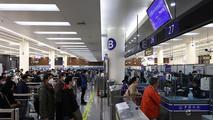 The first batch of visitors from the Hong Kong Special Administrative Region cross to the Chinese mainland at Futian port in Shenzhen on Jan 8, 2023. (PARKER ZHENG / CHINA DAILY)
The first batch of visitors from the Hong Kong Special Administrative Region cross to the Chinese mainland at Futian port in Shenzhen on Jan 8, 2023. (PARKER ZHENG / CHINA DAILY)
The business community in Hong Kong has applauded travel normalization with the Chinese mainland as a crucial step in accelerating the city’s economic recovery.
“Especially the sectors of retail, catering, inbound tourism and transportation will benefit from Hong Kong’s travel normalization with the mainland,” said Tommy Cheung Yu-yan, a Legislative Council member representing the catering Functional Constituency.
Starting Feb 6, the land border crossings between Hong Kong and the mainland will no longer have a cap on the number of people, and the pre-entry nucleic acid testing requirements will be abolished. All entry and exit ports will reopen.
READ MORE: Travel between mainland, HK & Macao to fully resume on Feb 6
As the mainland has resumed inbound tour groups, this will help stimulate more mainlanders to travel and participate in commercial activities in Hong Kong, thereby driving the inbound tourism industry, retail, catering, hotels and other industries to have accelerated recovery.
Allen Shi Lop-tak, president of Chinese Manufacturers’ Association of Hong Kong
Allen Shi Lop-tak, president of Chinese Manufacturers’ Association of Hong Kong, says travel normalization with the mainland is a crucial step to bring mainland tourists back to Hong Kong and provide strong support to the city’s domestic demand and accelerate economic recovery.
“As the mainland has resumed inbound tour groups, this will help stimulate more mainlanders to travel and participate in commercial activities in Hong Kong, thereby driving the inbound tourism industry, retail, catering, hotels and other industries to have accelerated recovery,” Shi notes.
The cancellation of nucleic acid testing and other requirements will also bring convenience to cross-border drivers, Shi argues. Smoother cross-border transportation is expected to speed up improvement of Hong Kong’s export and re-export performance this year.
However, Cheung expects it to take several months for enterprises to recoup their business losses during the COVID-19 pandemic. Enterprises have to resolve the labor shortage before they can really benefit from travel normalization, he said.
Cheung urged the Hong Kong Special Administrative Region government to consider importing labor especially in the retail and catering sectors where a labor shortage is rampant. “The catering industry currently is projected to register a manpower shortfall of 30,000 people covering job positions of waiters/waitresses, chefs and restaurant managers.”
“In addition to labor importation, the government should announce more initiatives in the upcoming budget, such as extending the Principal Payment Holiday Scheme and providing financial subsidies for enterprises to pay electricity and water charges as well as restaurant licencing fees,” Cheung said.
READ MORE: Back together again
“Open borders will fuel tourism and lift retail consumption, which will in turn increase rated property companies’ aggregate retail rental income by 5 percent to 10 percent in 2023. Prior to the pandemic, spending by mainland tourists accounted for around 30 percent to 40 percent of Hong Kong retail sales between 2010 and 2019,” Moody’s Investors Service said in its research note on Friday.


